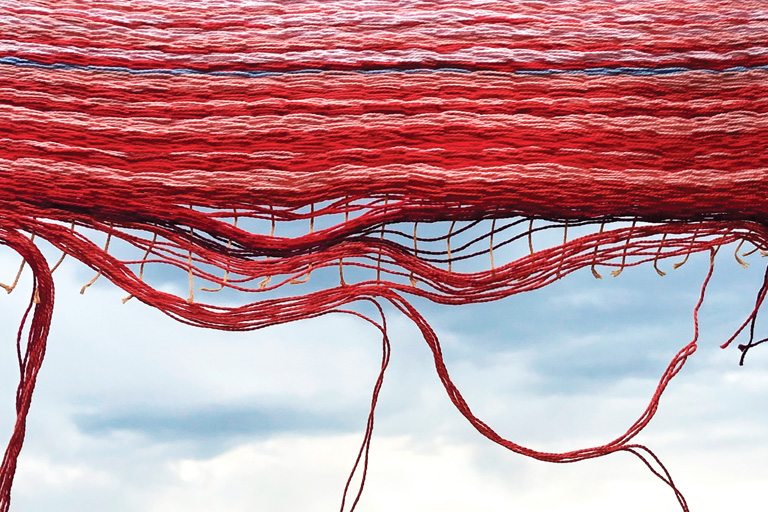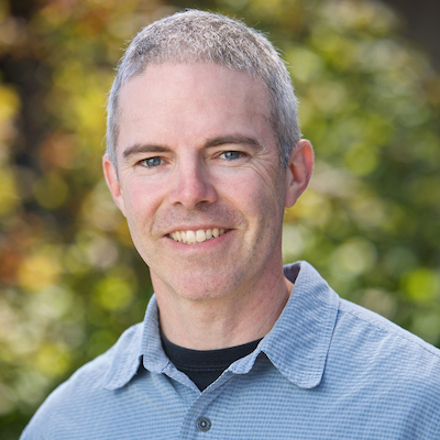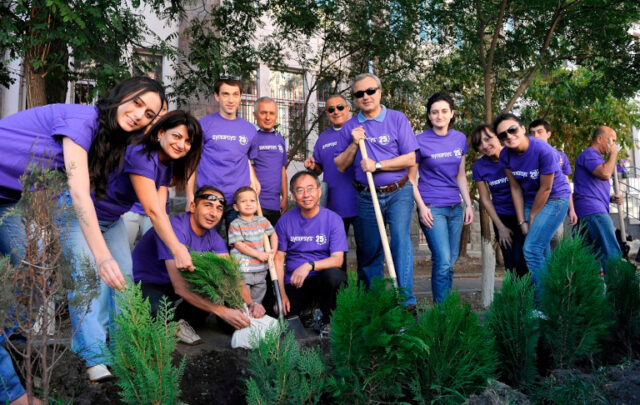This year Post Carbon Institute has leaned into the “Great Unraveling” as a label for framing what’s happening in modern society and the natural world. In short, the Great Unraveling represents humanity’s comeuppance from overshoot, a time when debts are coming due and the promise of everlasting growth is fading. Since the Industrial Revolution, we’ve experienced an unprecedented expansion of the human footprint, mostly driven by fossil fuel consumption and marked by inequality, that has put us in a precarious position. Humanity’s use of energy and materials, as well as the scale of our polluting emissions, have surpassed what the Earth’s biosphere can sustain. Despite all the growth in trade and consumption, billions of people grapple with poverty and poor living conditions. Given the scope of things going wrong simultaneously in environmental and social systems, the term “polycrisis” has come into vogue. The stark warnings and evidence from physical and social scientists alike have been ignored by most politicians, business leaders, influencers, and everyday citizens.
No one is immune from the Great Unraveling. Certainly there are people who, through their wealth, power, and privilege, can shield themselves for a time. But the tangle of global crises (climate destabilization, biodiversity loss, soil erosion, water scarcity, chemical pollution, resource depletion, technological change, war, poverty, inequality, racism and other forms of discrimination, and authoritarianism) eventually touches everyone.
Here at PCI, as we cover the Great Unraveling in more detail, we have two big goals: (1) help people understand why we’re in this position and (2) help people find prosocial ways to cope with the challenges. As 2023 comes to an end, I want to share how I’ve observed an aspect of the Great Unraveling in my neighborhood, describe a step I took so I could better navigate the challenges, and look ahead to 2024 when the PCI team will roll out an exciting new program to dive more deeply into understanding and responding to the Great Unraveling.
The Great Unraveling in My Backyard
I live near a busy roadway that routes lots and lots of automobiles through the urban landscape of Portland, Oregon. This road is an officially designated U.S. highway, and although the speed limit is 30 miles per hour, the volume of traffic creates a loud and busy scene. When this highway was constructed, the designers added many small parking areas adjacent to the main roadway. One of these parking areas, which used to have space for about a dozen vehicles, sits just a couple of blocks from where I live. I say “used to have” because huge concrete blocks now form a barrier that prevents any parking. The reason is pretty dark, and it says something important about life during the Great Unraveling.

When the COVID pandemic exploded on the scene in 2020, the number of people living on the streets of Portland also exploded. The parking area around the corner became a continuously occupied encampment. Several people set up tents and tarps and moved in. Others parked cars, trucks, and RVs and lived out of them. At times over the next couple of years, the encampment seemed like a community. People were living together in a tight space, and they were keeping the space relatively clean (I walked the sidewalk between the parking area and the roadway often, as I was a litter cleanup volunteer, so I regularly observed the scene). More often, however, the encampment felt chaotic. It came to feature a thriving drug trade, lots of litter, illegally dumped items (e.g., car tires, broken furniture), smells of urine and feces, rats (both dead and alive), and frequent conflicts. Spending the night without walls right alongside a busy road is already tough enough, but it looked entirely unhealthy and unsafe during those times when living conditions had deteriorated.
Every once in a while the city would send a team to warn people that they couldn’t camp in this spot, and a few days later social workers and police officers would force them out, and then a crew would haul away whatever materials and trash had been left behind. Within a day or two, new people would take up residence, and the cycle started anew. A turning point occurred earlier this year following a heartbreaking crime. One night in March a temporary resident of the lot was murdered. Soon thereafter, the city brought in the concrete barriers to dissuade camping and living out of vehicles. The site is still occupied from time to time, but not nearly to the degree it was prior to the murder. Of course, the concrete barriers don’t constitute a solution to the underlying problem—they obviously can’t bring the murder victim back to life, and the unsheltered people who can’t stay there have moved to other more accessible areas with many of the same issues present.
The reasons behind this local tragedy are not so simple to identify—there’s crossover among unaffordable housing prices, opioid addiction, systemic racism, ineffective governance, the COVID pandemic, improperly executed policies, mental illness, gaps in healthcare and social systems, crime, and a whole bunch of other destabilizing conditions. I could observe daily a Gordion knot of crises, all related and compounding. It’s not a stretch to imagine why I recognized this scene as part of the Great Unraveling.
Over the last several years, I’ve taken various actions in and around this parking lot. Mostly I picked up countless loads of litter and other unsavory waste. But I also talked with neighbors (both those who live in houses and those who don’t), gave away some homegrown fruit and extra clothing, intervened in a few conflicts, and called for professional help to attend to unsanitary conditions and a potential drug overdose. These were all simple and direct responses that only address symptoms (for a detailed story of such an intervention, listen to this episode of the Crazy Town podcast). Although I felt it was important to engage, this sort of intervention is not the step I want to share about navigating the challenges.
Working on Myself and Facing Reality
As I spent more time doing cleanups and other interventions, thinking about living conditions in the parking lot, and dwelling on why things were breaking down, I found that my attitude was slipping. I knew I couldn’t do much to solve neighborhood problems or help build community resilience if I couldn’t handle “being with” the reality around me. I was fortunate to be able to take a course, offered by the Good Grief Network, designed to help participants cope with the heaviness of climate grief and collective injustice.
The course, which is divided into ten sessions, convenes a group of about a dozen participants with a couple of professional facilitators. Each session consisted of grounding and mindfulness exercises, brief time for journaling to gather thoughts, several rounds of personal sharing on the topic of the session, and lots of active listening. The ten sessions ask participants to (1) accept the severity of the predicament, (2) be with uncertainty, (3) honor mortality, (4) do inner work, (5) develop awareness of biases and perception, (6) practice gratitude, witness beauty, and create connections, (7) take breaks and rest, (8) grieve the harm I have caused, (9) show up, and (10) reinvest in meaningful efforts.
In my estimation, the very first session (accept the severity of the predicament) happens to be the most challenging. It’s the step that comes with the most acute grief and the most questions about how to proceed, but it’s important to set the stage properly. This was the step I needed to gain more ability to “be with” what I’m observing. And it’s only through acceptance that it makes any sense to commit to the other steps in the program.
Going through the ten steps of the Good Grief Network was not pleasant (it’s not comfortable to share emotionally charged stories with colleagues), but it was helpful in coaxing me to process feelings that are simmering beneath the surface. And I got to relate to other caring people who are having similar thoughts and experiences. Since the course ended, I’m still considering how to apply what I learned, and our cohort is planning to meet regularly, so I’ll have a chance to continue figuring out how to cope with the toxic knowledge of our times. Moving forward, I know there’s a lot of work to do, and I feel more equipped to handle the rigors of doing that work. Speaking of which…
Doubling Down on Resilience
Given my career choices, I had been exposed to much of the material in each step of the Good Grief Network’s program (it even turns out that I had played a role in producing some of the content they use). There’s a reason I work for Post Carbon Institute—if there’s a job out there more in alignment with my worldview and values, I have yet to spot it. And as we go deeper into the Great Unraveling, we’re going to need the kind of thinking and content that my colleagues are so good at developing.
To that end, I am excited that we are launching a new program in 2024 called Resilience+. Our goal is to help members of our audience attain a deep understanding of the polycrisis, navigate mounting social and environmental challenges, and take action in their communities to build resilience. It’s exactly the sort of information and experience I was seeking as I came face to face with the Great Unraveling in my neighborhood. Resilience+ will provide special content, including:
- A series of live online events featuring experts on key polycrisis topics,
- Facilitated follow-up online sessions intended to encourage participants to process the information from the events and share actions to build resilience,
- Supplementary materials, including articles, interviews, and other educational and practical resources, and access to an online community.
I am looking forward to the meaningful work ahead, and I am also looking forward to doing that work with caring and committed colleagues. I am hopeful that we can support people to take action in their communities and that the results will be multiplicative (maybe they’ll even grow as fast as a fossil-fueled industrial-era economy?). In these days when we face challenges with extreme consequences, I can’t think of a better way to spend my time and effort.






